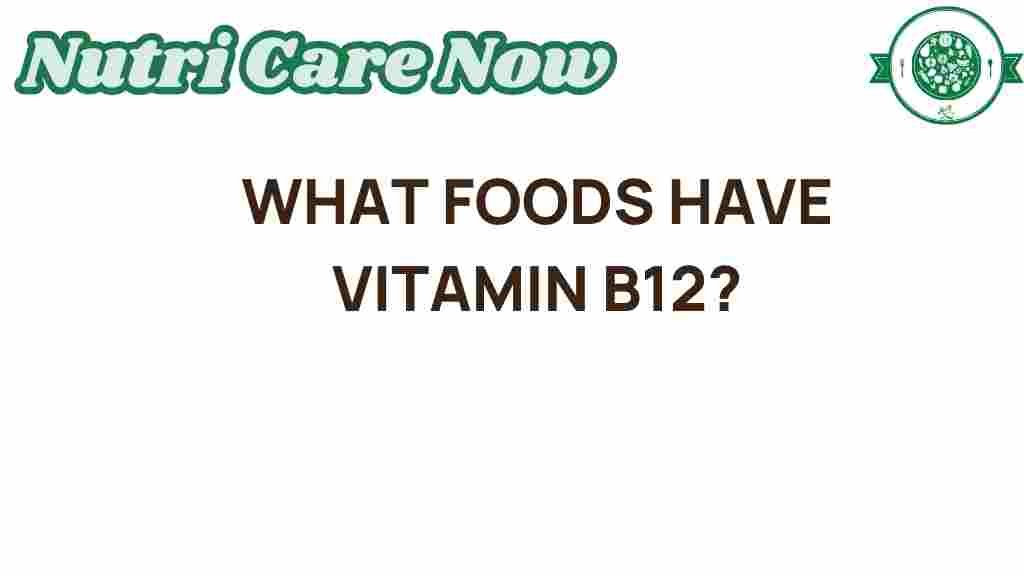Unlocking the Secrets: What Foods Are Rich in Vitamin B12?
Vitamin B12 is an essential nutrient that plays a crucial role in maintaining our overall health. It is vital for the production of red blood cells, DNA synthesis, and the proper functioning of nerve cells. Despite its importance, many individuals struggle to get enough Vitamin B12 in their diets. In this article, we will explore the various dietary sources of Vitamin B12, its health benefits, and the best ways to absorb it, especially for those following vegetarian or vegan diets.
The Importance of Vitamin B12 in Nutrition
Vitamin B12, also known as cobalamin, is one of the eight B vitamins. It is unique among vitamins because it contains a metal ion (cobalt) at its center. This vitamin is primarily found in animal products, making it a challenge for vegetarians and vegans to obtain sufficient amounts. Understanding the importance of Vitamin B12 can help you make informed dietary choices.
Health Benefits of Vitamin B12
Incorporating adequate amounts of Vitamin B12 into your diet offers numerous health benefits:
- Boosts Energy Levels: Vitamin B12 is essential for energy production. It helps convert food into glucose, which is used by your body as fuel.
- Supports Brain Health: This vitamin is crucial for maintaining cognitive function and preventing memory loss, particularly in older adults.
- Promotes Healthy Red Blood Cells: Vitamin B12 is necessary for the formation of red blood cells and can prevent anemia.
- Maintains Healthy Nerve Cells: It plays a significant role in the health and maintenance of nerve cells, preventing neurological disorders.
Dietary Sources of Vitamin B12
To ensure you’re getting enough Vitamin B12, it’s important to know which foods are rich in this nutrient. Here are some of the best dietary sources:
- Meat: Beef, lamb, and pork are excellent sources of Vitamin B12.
- Poultry: Chicken and turkey also provide significant amounts of this vitamin.
- Fish: Fish such as salmon, trout, and tuna are rich in Vitamin B12.
- Dairy Products: Milk, yogurt, and cheese contain good levels of Vitamin B12.
- Eggs: Eggs are a great source of Vitamin B12, especially the yolks.
Vegetarian and Vegan Options
If you follow a vegetarian or vegan diet, you may be concerned about getting enough Vitamin B12. Here are some options:
- Fortified Foods: Many plant-based milk alternatives, breakfast cereals, and nutritional yeasts are fortified with Vitamin B12.
- Dairy Alternatives: Look for fortified soy or almond milk.
- Nutritional Yeast: This deactivated yeast is often fortified with Vitamin B12 and can be added to various dishes for a cheesy flavor.
For more information on vegetarian options, you can check out this resource on plant-based nutrition.
Understanding Vitamin B12 Absorption
Absorbing Vitamin B12 can be a complex process. Here are key points to consider:
- Intrinsic Factor: This protein, produced in the stomach, is necessary for Vitamin B12 absorption. Without it, you may develop a deficiency.
- Gut Health: A healthy gut microbiome is crucial for optimal Vitamin B12 absorption.
- Aging: As we age, our bodies may produce less intrinsic factor, making it harder to absorb Vitamin B12 from food.
Signs and Symptoms of Vitamin B12 Deficiency
A deficiency in Vitamin B12 can lead to several health issues, including:
- Fatigue and weakness
- Memory loss and cognitive difficulties
- Nerve problems like numbness or tingling
- Glossitis and mouth ulcers
- Pale or jaundiced skin
Supplements for Vitamin B12
If you suspect that you are not getting enough Vitamin B12 through your diet, consider taking supplements. Here are some options:
- Cyanocobalamin: This is the most common form of Vitamin B12 supplement and is effective for most people.
- Methylcobalamin: This is a bioactive form of Vitamin B12 and may be beneficial for those with absorption issues.
- Dosage: The recommended dietary allowance (RDA) for adults is 2.4 micrograms per day. However, higher doses may be necessary for those with absorption problems.
Step-by-Step Process to Improve Your Vitamin B12 Intake
Enhancing your Vitamin B12 intake can be achieved by following these steps:
- Assess Your Diet: Evaluate your current diet to identify sources of Vitamin B12.
- Incorporate Rich Foods: Add more animal-based foods or fortified products to your meals.
- Consider Supplements: If necessary, consult with a healthcare provider about taking Vitamin B12 supplements.
- Monitor Your Health: Keep an eye out for any signs of deficiency and get regular check-ups.
Troubleshooting Tips for Vitamin B12 Deficiency
If you are experiencing symptoms of Vitamin B12 deficiency, consider these troubleshooting tips:
- Consult a Healthcare Professional: If you suspect a deficiency, get tested for Vitamin B12 levels.
- Evaluate Your Diet: Ensure you are consuming enough food sources high in Vitamin B12.
- Check for Absorption Issues: Discuss any gastrointestinal issues with your doctor that may affect absorption.
- Explore Injection Options: For severe deficiencies, Vitamin B12 injections may be necessary.
Conclusion
Vitamin B12 is a vital nutrient that supports energy production, brain health, and the formation of red blood cells. Understanding the dietary sources of Vitamin B12, especially for vegetarians and vegans, can help individuals maintain optimal health. By incorporating rich sources of Vitamin B12 into your diet and considering supplementation if necessary, you can combat deficiencies and enjoy the numerous health benefits this essential vitamin offers. Remember to monitor your health and consult with a healthcare professional if you have concerns about your Vitamin B12 levels.
This article is in the category Diet and created by NutriCareNow Team
